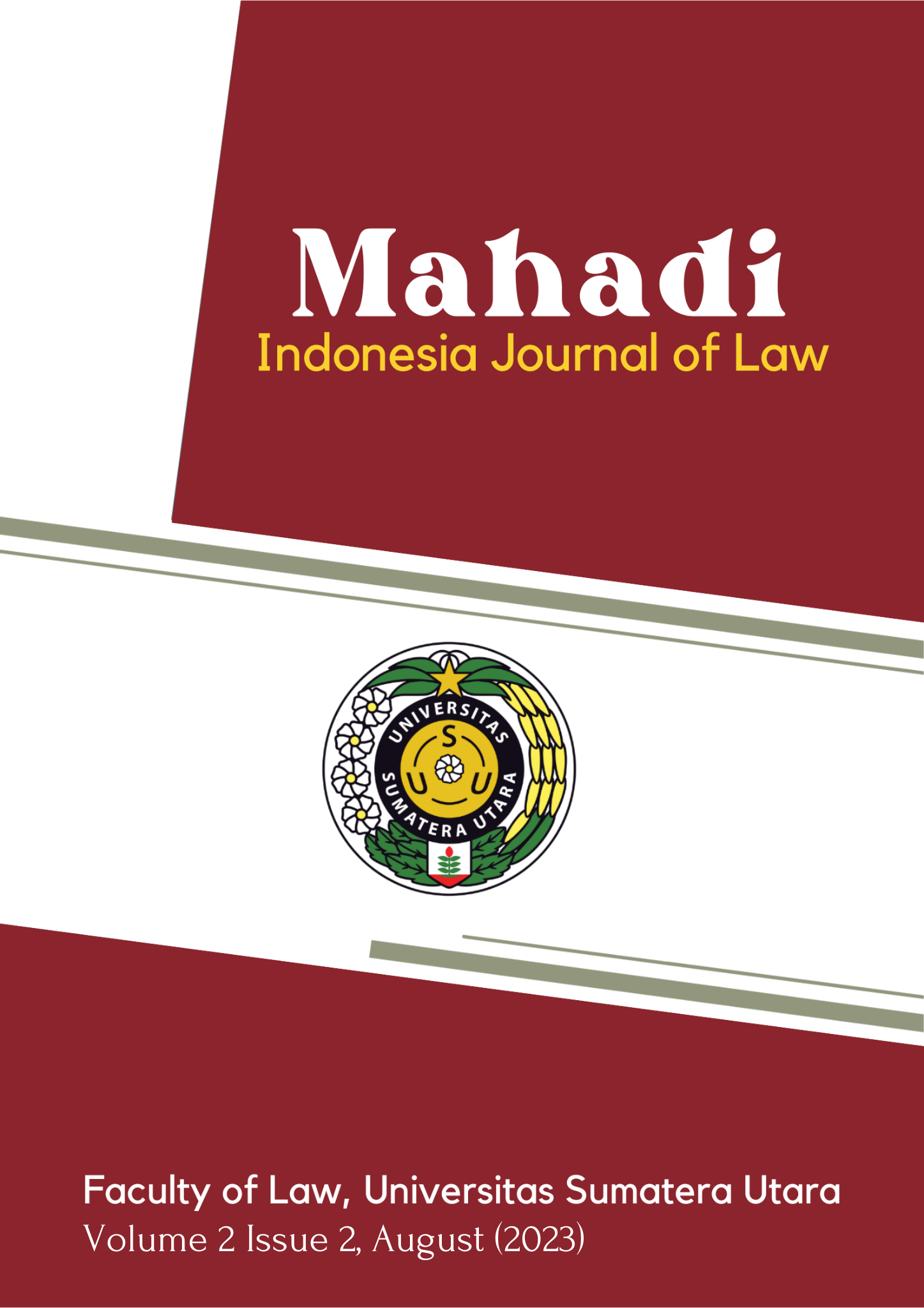Reform of Labor Wage Determination Provisions: Review of Welfare and Importance in the Job Creation Law
DOI:
https://doi.org/10.32734/mah.v2i2.13125Keywords:
Job Creation, Labor, Wages.Abstract
The passing of the Job Creation Law by the government is considered to show more partiality to investors or entrepreneurs and marginalizes labor rights, especially in terms of wages, Indonesia's goal to create and guarantee community welfare in accordance with the concept of the Welfare State (Welfare State) adopted becomes blurred. This article focuses on the discussion related to the first the determination of the minimum wage submitted to the authority of the Governor and by referring to the economic growth of the Regions and inflation conditions of each Region. Second, the Decent Living Needs (KHL) is no longer an indicator of determining the minimum wage for workers. Third, the abolition of sectoral minimum wages previously in the Manpower Law. This article uses the Juridical-Normative research method. This article found that the Economic growth and inflation rate of each region / province vary. Thus the Minimum Wage cannot be equated between people in each region. In an effort to realize equality of position for employers, Law No. 6 of 2023 has denied the state's obligation to protect workers' rights, thus clashing with Article 27 paragraph (2) of the 1945 Constitution. The policy of abolishing the sectoral minimum wage in the Job Creation Law will cause inequality between sectors and cause a sense of injustice for workers.
Downloads
References
Dewi, H.K. (2023). Daya Beli Lemah, Pertumbuhan Ekonomi Kuartal I-2023 Berpeluang Tak Capai 5%. Available at https://nasional.kontan.co.id/news/daya-beli-lemah-pertumbuhan- ekonomi-kuartal-i-2023-berpeluang-tak-capai-5
Abas, M. (2022). "The Impact of Losing Sectoral Minimum Wage for Workers After the Enactment of Government Regulation (Pp) No. 36 of 2021 concerning Wages Juncto Law No. 11 of 2020 Concerning Job Creation (Omnibus Law)â€. Proceedings of the National Conference on Research and Service at Buana Perjuangan University, Volume 2 Number 1.
Dewi, H.K. (2023). Daya Beli Lemah, Pertumbuhan Ekonomi Kuartal I-2023 Berpeluang Tak Capai 5%. Available at https://nasional.kontan.co.id/news/daya-beli-lemah-pertumbuhan- ekonomi-kuartal-i-2023-berpeluang-tak-capai-5
Fauzani, E. (2019). "Analysis of the Influence of Economic Growth, Provincial Minimum Wage on Employment Opportunities in Jambi Province". Economics: Journal of Economics and Business, Volume 3 Number 1
Freeman, R.B., 2010. Labor regulations, unions, and social protection in developing countries: Market distortions or efficient institutions?. Handbook of development economics, 5, pp.4657-4702.
Hakim, Y. R. (2021). "Omnibus Law Policy in the Perspective of Labor Policy in Indonesia". PolGov Journal, Volume 3 Number 1
Howell, D.R., Baker, D., Glyn, A. and Schmitt, J., 2007. Are protective labor market institutions at the root of unemployment? A critical review of the evidence. Capitalism and Society, 2(1).
Ihlanfeldt, K.R. and Sjoquist, D.L., 1998. The spatial mismatch hypothesis: A review of recent studies and their implications for welfare reform. Housing policy debate, 9(4), pp.849-892.
Iksan, S. A. N., Arifin, Z., & Suliswanto, M. S. W. (2020). The Effect of Provincial Minimum Wage, Investment and GRDP on Labor Absorption in Indonesia. Journal of Economics, Volume 4 Number 1
Korida, N. U. Y., & Muhsin, M. (2021). Wage Determination and Wage Scale Structure in the Job Creation Law. Journal of Legal Anthology, Volume 1 Number 2
Manika, A. S. (2022). "Juridical Study Regarding Determining the Amount of Workers' Wages Based on Article 88 C of Law Number 11 of 2020 Concerning Job Creation". Journal of Legal Communication (JKH), Volume 8 Number 2
Nurtiyas, F. (2016). Analysis of Factors Influencing the Provincial Minimum Wage in Java Island 2010-2014. Journal of Education and Economics, Volume 5 Number 2
Purnama, N. S., Gunawan, G., & Ramdhani, F. A. R. A. (2021). "Effectiveness of Labor Wage Arrangements Based on Law Number 11 of 2020 Concerning Job Creation". Journal of Law Glorification, Volume 4 Number 1
Rusniati, R., Sudarti, S., & Agustin, A. F. (2018). "Analysis of the Influence of Economic Growth and Minimum Wage on Labor Absorption in Malang Regency". FALAH: Journal of Islamic Economics, Volume 3 Number 2
Sarni, Y. (2023). "The Influence of Gender Inequality on Economic Growth in Indonesia" (Doctoral dissertation, UIN Ar-Raniry Faculty of Islamic Economics and Business)
Sholeh, M. (2005). "The Impact of Increasing the Provincial Minimum Wage on Employment Opportunities (Case Study of Central Java Province)". Journal of Economics and Education, Volume 2 Number 2
Siebert, H., 1997. Labor market rigidities: at the root of unemployment in Europe. Journal of Economic perspectives, 11(3), pp.37-54.
Sihombing, S. (2022). “Wage Protection According to the Copyright Law Sukmana, O. (2016). "Concept and Design of the Welfare State". Sospol Journal, Volume 2 Number 1
Undang-Undang Nomor 13 Tahun 2003 Tentang Ketenagakerjaan
Undang-Undang Nomor 6 Tahun 2023 Tentang Cipta Kerja
Wiswamitra, I. B. G., Budiartha, I. N. P., & Utama, I. W. K. J. (2022). "Juridical Study Regarding Determining the Amount of Workers' Wages Based on Article 88 C of Law Number 11 of 2020 Concerning Job Abas, M. (2022). “Dampak Hilangnya Upah Minimum Sektoral Bagi Pekerja Pasca Berlakunya Peraturan Pemerintah (Pp) No. 36 Tahun 2021 Tentang Pengupahan Juncto Undang-Undang No. 11 Tahun 2020 Tentang Cipta Kerja (Omnibus Law)â€. Prosiding Konferensi Nasional Penelitian Dan Pengabdian Universitas Buana Perjuangan Karawang, Volume 2 Nomor 1.
Downloads
Published
How to Cite
Issue
Section
License
Copyright (c) 2023 Chelsea Mutiara Putri, Annisa Khairiyah Hutapea, Zaky Ihsan Edy Ramadhani

This work is licensed under a Creative Commons Attribution-ShareAlike 4.0 International License.











